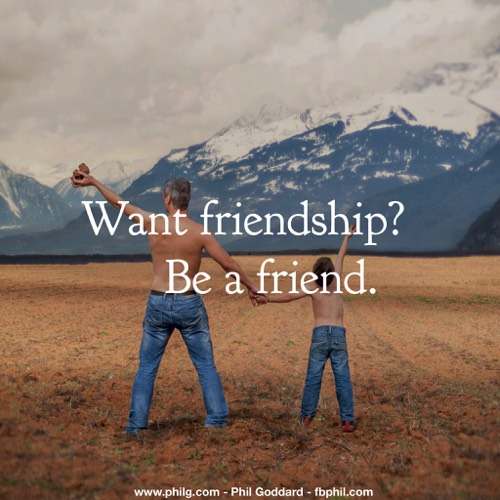Parenting Friendship

I’ve heard this quite a few times during the last fifteen or so years. Naturally I feel some pride, but I also always feel a tinge of sadness too.
Simply because to have the kind of relationship which we both describe as ‘best friends’ is generally much easier than the people who state this desire seem to believe.
For me it was a very simple shift. I remember the exact moment I chose to no longer be the policing, authoritarian parent and instead chose to BE my son's best friend. There is nothing complicated about that, if you want someone's friendship, be their friend.
Sadly, we’ve all seen it; parents berating their children, issuing demanding instructions, dictating what they should or shouldn't do next, and speaking to them in ways that they would never dream of talking to their best friends.
If you talk to your child aggressively, put very simply, they will develop an aggressive relationship with you. If you speak to your child lovingly, with understanding, they will develop a loving and understanding relationship with you.
If you are constantly at war with your child, particularly with a young child who has very little other experience of the world, they will see the world as a war zone.
In reality, once I had made the choice to be my son’s friend, life became much more pleasant and easier. Seeing other parents be at war with their children and struggle through their version of parenthood saddens me because living that way is both unnecessary and the most difficult path to take. Once I had chosen friendship over what might be described as ‘traditional parenthood’ (in my opinion archaic and draconian parenthood), being with my son was effortless.
Have you ever considered which is more enjoyable, being with your loving and understanding friends, or having an argument with someone who rarely agrees with you?
The most natural thing for any of us to do when we feel either threatened or attacked is to either get defensive or attack back, especially when we are children and are still developing the social skills of survival.
If someone spoke to you, yes you the parent, saying things like "what are you doing now?" or “stop that! come here now!” in a very demanding voice, would you feel compelled to comply, and endeared to be helpful to that person? Yet, time and time again, this is the kind of language I hear some parents using with their children. A barrage of constant instructions, interrogation, exclamations, as if everything the child is doing is vindictive and wrong. No attempt is ever made to understand the child’s thinking, to deeply connect and understand them so that they can be pointed towards love.
All children's behaviour is innocent and is only ever a reflection of how they see the world. They learn how to see that world mostly from their parents. If they see the world as antagonistic that is indeed how they will behave.
Children learn to think the whole world is against them if the majority of the communication they have with their parents is aggressive, authoritarian, and instructive. When our children are allowed to freely express themselves, to explore, are appreciated and encouraged and understood, they learn to see the world as cooperative and supportive and understanding, and in turn mirror back cooperative and supportive behaviour.
Gandhi really did teach us so much from what is my most favourite quote:
‘Be the change you wish to see in the world.’
If you want to have the kind of relationship with your child that is predominantly one of friendship there is only one very simple way of creating that:
Be that child's best friend. Be that child’s most supportive, most encouraging, most understanding, most patient, most accepting, most fun, most approachable, most trustworthy, most trusting, most connected, most affectionate and most loving best friend.
